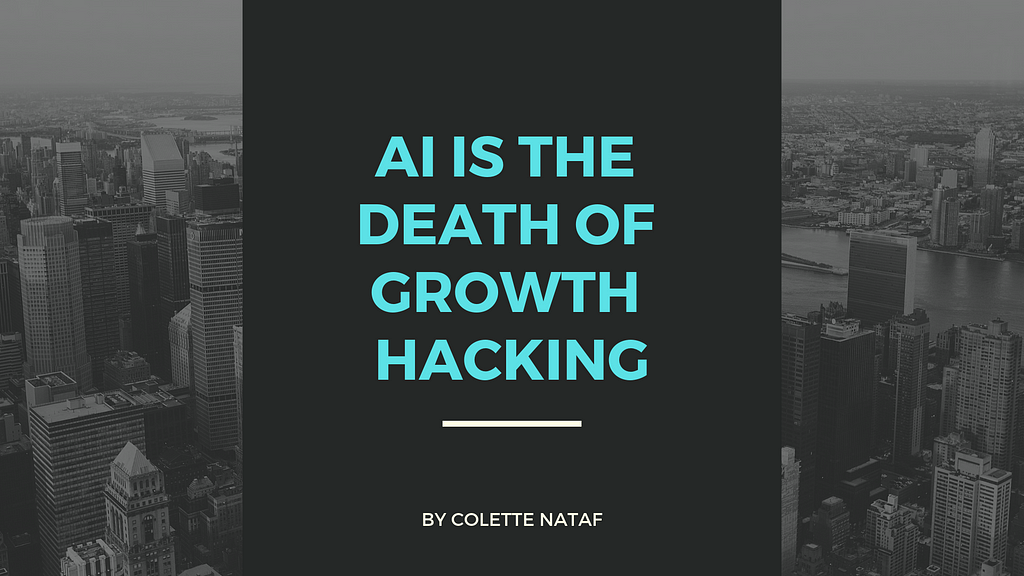Latest news about Bitcoin and all cryptocurrencies. Your daily crypto news habit.

It’s no secret that nothing is really steady in the startup world. What remains constant is the idea of people consistently coming up with new and improved concepts to grow and scale. And although it seems like everyone is constantly in a race to become more intelligent and discover the next best thing, the tech industry’s new story is here to stay.
It’s the story of artificial intelligence.
But first, before there was artificial intelligence, we had growth hacking. Growth hacking is a broader term for marketing strategies that are focused solely on growth. The term “growth hacking” was coined by Sean Ellis in 2010 when he founded his company GrowthHackers. It’s a term often used in early-stage startups when companies are looking to grow as fast as possible. And typically, not only do these startups need massive growth, but they’re usually operating on a small budget.
Unlike traditional marketing practices where companies engage in paid advertising and sponsored content to reach new customers, growth hacking seeks to skip over those marketing tactics. They don’t want to spend the time and money it takes to acquire new customers through traditional marketing efforts. So instead, these startups look for growth hackers who find unique ways to exploit as many small opportunities as possible. These people are also commonly referred to as “growth marketers.”
The main goal of growth hacking has always been to acquire as many customers as possible while spending the least amount of capital. It’s been a viral term for over a decade now, but as the tech industry keeps involving, growth hacking is becoming a thing of the past.
How does AI work?
A lot has changed since Sean Ellis coined the term growth hacking. We’ve had nine years of innovation in the tech space, and since then companies have begun creating creating software based on artificial intelligence that ultimately achieves the same results as growth hackers. And instead of having a human find and determine ways to significantly grow and scale, they’re using automated strategies with the click of a few buttons. Not only is this cost-efficient, but it’s also extremely results-oriented.
Some people think of AI as just one specific technology, but it’s not. It’s a bunch of different types of software that businesses can use in various ways. On the topic of marketing and growth hacking, AI is essentially a mix of automated tools and services that track, measure, and grow advertising campaigns. At Lightning AI, our AI system automatically creates new Facebook interest groups and Google keywords for your ad campaigns. Long gone are the days of A/B split testing campaigns for months just to try to find your ideal audience.
Artificial intelligence (AI) has made a big impact on the advertising industry in recent years. It’s changed the way we work and has given us entirely new sets of tools and strategies to test. These tools are excellent for analyzing large data sets, automating systems and workflows, running A/B tests, and optimizing audiences for paid ads. As a marketer, much of what you once did manually can now be done by an AI tool. Although there are a lot of pros to AI, one of the largest cons is the big question mark surrounding growth hackers. Due to the rich capabilities and consistent improvements to AI, many believe that traditional growth hackers are a dying breed.
AI vs. Growth Hackers: An in-depth look
Could the continual advancement of AI be the death of growth hackers? Let’s look at an example scenario and analyze a real-life situation.
Scenario: You work at at an early stage startup in San Francisco as a growth marketer. You arrive to work early one morning to learn that the Facebook ad costs dropped on two of your ad sets. By that time, unfortunately, it’s probably too late. But AI-powered campaigns catch these changes and shifts immediately, meaning you’ll never get behind the curve. In this scenario, AI-powered marketing campaigns win over traditional growth hacking. Humans simply can’t act as fast as AI-powered technology.
More and more companies are moving towards AI for obvious reasons:
- Much more scalable
- Automation is key
- Saves time and money
- Quicker, more efficient results
- Less manpower required
As startups and marketers continue to move towards AI, growth hacking as an artform is going to die out. This doesn’t necessarily mean that all growth marketers will be out of a job, but more so that their marketing roles and capabilities will change. The smart growth marketers will tie together a number of AI companies and take advantage of every opportunity. They’ll use AI to power their startups because even though machine learning will replace many traditional human marketing jobs, machines lack human empathy. The human (former growth marketer) will still have to decide which tools to use in order to solve specific business challenges. So, although “growth hacking” will die out in the traditional sense of the term, smart growth marketers who adapt to change will continue to thrive and find innovative ways to make a difference through AI-powered marketing. They’ll play a different role alongside AI and be faced with new and exciting challenges as things continue to evolve.
The story of artificial intelligence is here to stay.
AI is the death of growth hacking was originally published in Hacker Noon on Medium, where people are continuing the conversation by highlighting and responding to this story.
Disclaimer
The views and opinions expressed in this article are solely those of the authors and do not reflect the views of Bitcoin Insider. Every investment and trading move involves risk - this is especially true for cryptocurrencies given their volatility. We strongly advise our readers to conduct their own research when making a decision.